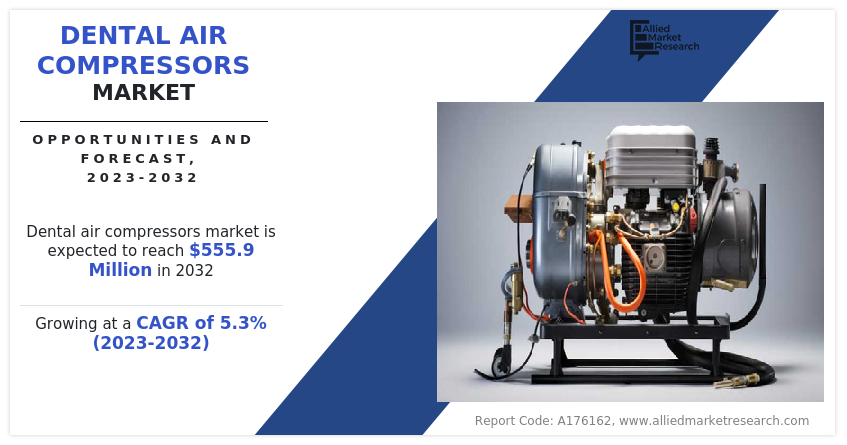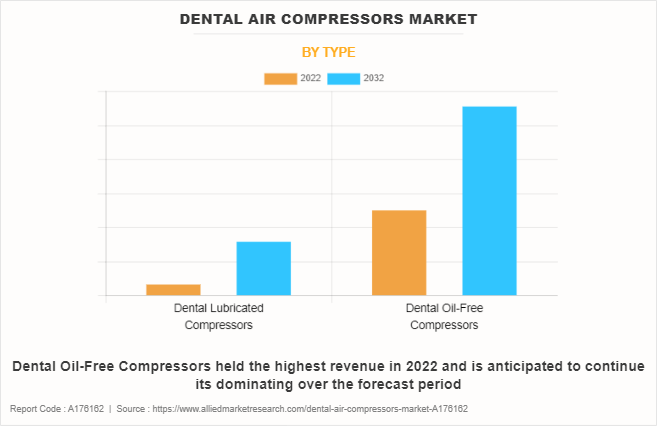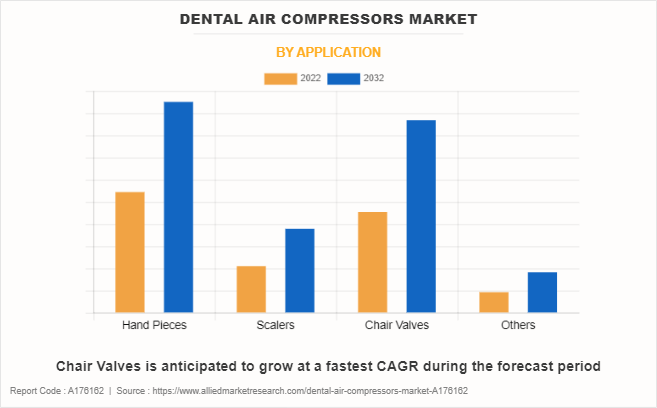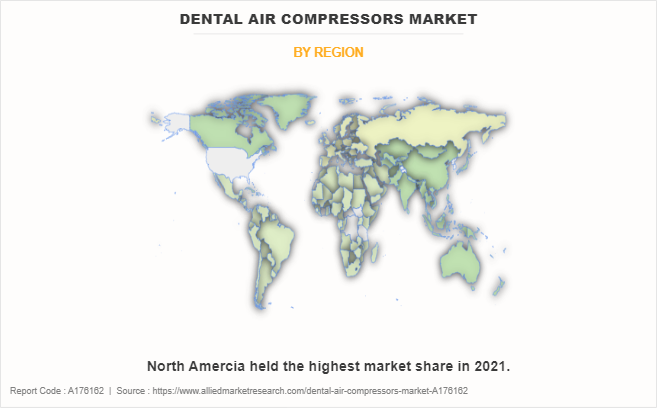Dental Air Compressors Market Research, 2032
The global dental air compressors market size was valued at $340.3 million in 2022, and is projected to reach $555.9 million by 2032, growing at a CAGR of 5.3% from 2023 to 2032. A dental air compressor is a machine that creates high-quality, high-pressure air, which is then delivered through specialized lines to dental operatories, where it runs the handpieces that a dentist or hygienist uses to clean and treat a patient’s teeth. Their major role is to compress ambient air, filter it to fulfil the strict quality criteria imposed by dental organizations, and store it in tanks for on-demand usage.

Compressors, air dryers, filters, and reservoir tanks are all important components in this process. The compressor is the core equipment responsible for pressurizing the air, and it functions in multiple modes to fulfil the specialized requirements of different dental instruments, ranging from high-speed handpieces that require high-pressure air to more delicate duties that require lower pressure. Dental air compressors are classified into several varieties, each responding to a distinct demand in dental practice.
The emphasis on patient comfort is one of the key factors influencing for the usage of dental air compressors. Modern dental operations frequently necessitate the use of high-speed handpieces, air-driven scalers, and other precise devices. Dental air compressors provide a steady and reliable source of compressed air while minimizing vibrations and noise, reducing patient concern and pain. Most dental instruments, from handpieces to ultrasonic scalers, rely on pressurized air to function. Dental air compressors are the core of these tools, making them important to dental specialists. Many dental diagnostic instruments, such as intraoral cameras and digital radiography, require compressed air to function properly. A dependable compressor assures the precision of these diagnostic operations. Dental air compressors provide for more precise control of dental equipment, resulting in more accurate treatments and better patient results. All thses factors are anticipted to drive the dental air compressors market growth
Microbial contamination within the compressor system is a key source of concern. Dental air compressors may become an incubator for bacteria, viruses, and fungi if not properly maintained and monitored on a regular basis. The moist atmosphere and high temperatures within the compressor create an ideal environment for microbial proliferation, possibly contaminating the compressed air that comes into direct contact with dental equipment and patient oral cavities. This problem gets worse by the fact that dental patients usually have compromised immune systems, making them more prone to infections.
Another limitation is from the presence of oil in compressed air, which makes maintaining air quality in dental settings challenging. Lubricated compressors, which are commonly used in dental practices, may introduce traces of oil into the compressed air stream. Inhaling or swallowing oil-contaminated air during dental procedures can have serious health repercussions for patients, including respiratory issues and allergic reactions.
Dental tourism has become a global trend, with people flying to other countries in search of cost-effective and high-quality dental procedures. Many dental clinics and hospitals in key dental tourism destinations rely on modern technology, such as dental air compressors, to deliver competitive treatments that attract overseas consumers. This shift is expected to create growth opportunities for dental air compressor producers to deliver cutting-edge equipment to key global healthcare centers. As technology advances, so does the potential for these tools to improve and provide even greater benefits to dental practitioners.
For example, contemporary dental air compressors are being developed to be more energy-efficient, quieter, and ecologically friendly. This push towards sustainability not only decreases the environmental impact of dental practices, but it also corresponds with the rising need for eco-friendly solutions in healthcare. Furthermore, the incorporation of smart technologies and digital interfaces in dental air compressors is opening the way for data-driven diagnostics, predictive maintenance, and remote monitoring. This permits preventive maintenance, saving downtime and assuring flawless dental operations.
The key players profiled in this report include Midmark Corporation, Gnatus, Air Techniques, Kaeser Dental, Atlas Copco, General Air Products, Inc., Durr Dental, Slovadent, Aixin Medical Equipment Co, Ltd, and Dental EZ Group. After-sales support and international expansion are common strategies followed by major market players. For instance, Midmark Corp., a renowned provider of dental solutions, revealed its partnership with Bien-Air Dental SA in February 2022. The collaboration aims to combine the distinguished dental technologies of both companies into a streamlined care delivery system. The dental air compressors market is segmented on the basis of type, technology, application, and region. By type, it is divided into dental lubricated compressors and dental oil-free compressors. By technology, it is classified into desiccant based compressors and membrane-based compressors. By application, it is divided into hand pieces, scalers, chair valves, and others. By region, the market is analyzed across North America, Europe, Asia-Pacific, and LAMEA
The dental air compressors market is segmented into Type, Technology and Application.

By type, the dental oil free compressors sub-segment dominated the global dental air compressors market size in 2022. Oil-free compressors are a type of air compressor that operates without the use of oil in the compression chamber. These compressors are designed to produce clean, high-quality compressed air without the risk of oil contamination. They are commonly used in applications where oil-free air is essential, such as in medical facilities, laboratories, food & beverage industries, and electronics manufacturing.. Oil-free compressors run without the need of lubricating oil, preventing oil contamination in the compressed air. This is critical for maintaining the cleanliness of the air used during dental operations. They contain advanced filtration systems to remove particles, moisture, and other pollutants from compressed air, assuring a clean and dry air supply.
[TECHNOLOGYGRAPH]
By technology, the desiccant based compressors sub-segment dominated the global dental air compressors market share in 2022. Desiccants are chemicals that have an extraordinary capacity to absorb moisture from the surrounding air. This moisture-absorbing characteristic is game-changing in the context of dental air compressors. Traditional oil-lubricated compressors frequently struggle to maintain dry, clean air, which is critical for dental tools and patient safety. Desiccant-based compressors, on the other hand, overcome this problem by actively eliminating moisture from the compressed air, assuring a continuous high-quality air supply. This invention ensures that dental practitioners may work with accuracy since tools perform precisely and without the risk of contamination.

By application, the hand pieces sub-segment dominated the global dental air compressors market share in 2022. Handpieces in dental air compressors serve an important part in guaranteeing the efficacy and efficiency of dental operations. These compact and lightweight devices are essential equipment for dentists, dental hygienists, and dental assistants. Dental handpieces, which are designed with accuracy and modern technology, are responsible for a variety of duties in dental practices, including drilling, polishing, cleaning, and cutting. High-speed handpieces are essential for cutting and shaping teeth, especially during operations like cavity preparation and crown insertion. They work at extraordinarily high rates, ranging from 300,000 to 400,000 revolutions per minute (RPM), making them ideal for accurate and efficient tooth preparation. Electric handpieces are gaining popularity because of their superior control and low noise levels.

By region, North America dominated the global dental air compressors market in 2022. The region's dedication toward healthcare quality is one of the major elements leading to the prevalence of dental air compressors in North America. Dental practitioners realize the need for accurate, dependable, and pure air for a variety of dental treatments such as cleaning, filling, and surgery. Therefore, they have been in the forefront of implementing cutting-edge air compressor technology that meet strict industry requirements. This commitment toward quality has resulted in the creation of extremely efficient and meticulously constructed dental air compressor systems.
To meet the specific demands of the dental care sector, North American dental air compressor manufacturers have embraced a variety of new technologies. Oil-free compressors, for example, are gaining popularity in the region due to their capacity to supply clean, contamination-free air, assuring patient safety, and reducing the danger of infection.
Impact of COVID-19 on the Global Dental Air Compressors Industry
- The COVID-19 pandemic had a detrimental influence on the dental industry due to the postponement of the bulk of elective procedures. As dental treatments were considered as an optional and high-contact service, the majority of dental clinics were shuttered. When countries implemented lockdown, the supply of medical supplies and the raw materials needed to make them was restricted.
- The forced lockdowns that occurred across the world had a severe detrimental impact on the supply chain. Several restrictions imposed by the government to halt the virus's spread and public fear of infection had an impact on the market.
- This has decreased the demand for dental air compressors in certain circumstances, as not all treatments require the use of compressed air. However, air compressors remain an important component of dental equipment for in-person dental operations. In response to the pandemic, dental practitioners had to receive additional training and teaching on infection control and safety practices.
Key Benefits For Stakeholders
- This report provides a quantitative analysis of the market segments, current trends, estimations, and dynamics of the dental air compressors market analysis from 2022 to 2032 to identify the prevailing dental air compressors market Opportunity.
- The market research is offered along with information related to key drivers, restraints, and opportunities.
- Porter's five forces analysis highlights the potency of buyers and suppliers to enable stakeholders make profit-oriented business decisions and strengthen their supplier-buyer network.
- In-depth analysis of the dental air compressors industry segmentation assists to determine the prevailing market opportunities.
- Major countries in each region are mapped according to their revenue contribution to the global market.
- Market player positioning facilitates benchmarking and provides a clear understanding of the present position of the market players.
- The report includes the analysis of the regional as well as global dental air compressors market trends, key players, market segments, application areas, and market growth strategies.
- Based on region, North America registered the highest market share in 2022 and is projected to maintain its position during the forecast dental air compressors market forecast period.
Dental Air Compressors Market Report Highlights
| Aspects | Details |
| Market Size By 2032 | USD 555.9 million |
| Growth Rate | CAGR of 5.3% |
| Forecast period | 2022 - 2032 |
| Report Pages | 280 |
| By Type |
|
| By Technology |
|
| By Application |
|
| By Region |
|
| Key Market Players | Slovadent, ELGI, Atlas Copco, Air TECHNIQUES, Midmark Corporation, General Air Products, Inc., Gnatus, Durr Dental, Dental EZ Group, Kaeser Dental |
The dental air compressors market size is expected to grow due to surge in rising awareness about precision dentistry globally. In addition, the market is driven by growth in advancement of dental equipment and technology.
The major growth strategies adopted by the dental air compressors market players are after-sales support and international expansion.
Asia-Pacific will provide more business opportunities for the global dental air compressors market in the future.
Atlas Copco, Midmark Corporation, Gnatus, and Air Techniques are the major players in the dental air compressors market.
The dental oil-free compressors sub-segment of the type acquired the maximum share of the global dental air compressors market in 2022.
The report provides an extensive qualitative and quantitative analysis of the current trends and future estimations of the global dental air compressors market from 2022 to 2032 to determine the prevailing opportunities.
The adoption of dental air compressors is expected to be primarily driven by various applications in the dental industry, as dental air compressors play a crucial role in powering dental chair operations, providing the necessary compressed air for tools used in procedures such as drilling, polishing, and cleaning.
Loading Table Of Content...
Loading Research Methodology...


